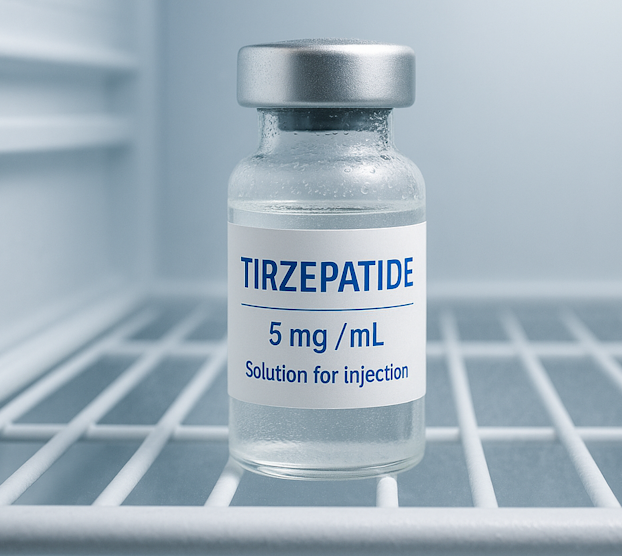If you’ve recently heard of tirzepatide sold for weight loss under brand names like Mounjaro® or Zepbound™, you’ve likely wondered: does tirzepatide need to be refrigerated? The short answer is yes, but the details matter. Proper storage helps ensure the compound stays stable, effective, and safe for research or clinical use.
Because this peptide activates two receptors that regulate appetite and blood sugar, the weight loss medication comes in a form that must remain chemically stable for these receptors to trigger your hormones to work effectively. Exposure to extreme temperature changes or prolonged room temperature storage can break down peptide chains, decreasing its therapeutic efficacy. Below, we explain how to store tirzepatide correctly, how long it can stay unrefrigerated after three weeks, and how to protect it during international travel.
Why Tirzepatide Needs Refrigeration
Tirzepatide injections contain delicate peptide bonds that can degrade under heat or sunlight. Like many biologically active weight loss medications, it’s highly sensitive to extreme temperatures. To preserve stability, refrigerated storage between 36°F and 46°F (2°C–8°C) is ideal, but be aware that ambient temperature can also impact its effectiveness.
If you’re using compounded tirzepatide from a compounding pharmacy, the same storage guidelines apply. New to powdered formulations? Read our overview of lyophilized tirzepatide, including what it is, how it’s handled, and how storage affects stability.
Keeping the peptide in a cool, dark environment ensures that it stays active for longer periods and remains chemically intact, so remember to keep your injection pens stored correctly. Extreme temperatures can break the molecular structure, leading to expired product or reduced activity long before the expiration date printed on the label.
Room Temperature and Short-Term Stability
Can tirzepatide stay at room temperature? Yes, but only temporarily. Most manufacturer data show that tirzepatide injection pens can safely remain at room temperature (up to 86°F / 30°C) for up to three weeks without significant potency loss. After that period, peptide degradation increases rapidly, and can expire sooner than expected.
Even when stored unrefrigerated after three weeks, visual inspection is crucial. If the solution appears cloudy, discolored, or different in texture, discard it immediately. Many patients worry about how heat can affect its stability, and those concerns are valid; extreme temperature changes can reduce potency over time. The best approach is to maintain a healthy storage habit by keeping the medication consistently within the recommended temperature range to ensure safety and effectiveness.
Want to see how time out of the fridge affects clearance? Here’s how long tirzepatide stays in your system, including a weekly decay chart.
Proper Storage for Tirzepatide Injection Pens
When learning how to keep your injection pens safe, remember that stability depends on consistent temperature and avoiding extreme temperature changes. Never place tirzepatide in the freezer, as freezing damages peptide structure. Instead, keep the pens in the refrigerator’s main compartment (not the freezer compartment) and away from direct sunlight.
Each device has a printed expiration date, and keeping it stored correctly ensures the product remains stable until that date. Manufacturers often design injection pens for both refrigerated and short-term room temperature use, so check your medication’s label for specific instructions. When in doubt, store these medications effectively within the 36°F–46°F range for maximum shelf life.
Traveling With Tirzepatide
Whether you’re flying domestically or on international travel, proper storage is critical. Always travel with tirzepatide in your carry on bag, not checked luggage, to prevent exposure to extreme temperatures. Airport cargo holds can exceed 86°F, risking peptide degradation.
During transit, use insulated pouches or gel packs to maintain the ideal temperature range. Avoid direct contact between the injection pens and frozen packs, as overly cold conditions can harm the formulation. Extreme temperatures can break the delicate balance needed to preserve peptide efficacy.
If you must store it at room temperature temporarily, ensure it remains under 86°F and away from direct sunlight; Even while traveling, maintain a healthy lifestyle and follow storage guidelines to keep doses potent for your ongoing weight loss regimen.
Compounded Tirzepatide Storage and Expiration
Compounded tirzepatide formulations may come in multi-use vials with shorter shelf lives than commercial injection pens. The expiration date often falls within 60–90 days of compounding. Because these formulations lack preservatives found in branded options, proper storage is essential. Always refrigerate between 36°F and 46°F and note the expiration date printed clearly on the vial.
If compounded tirzepatide is left outside the refrigerator for more than three weeks, discard it to avoid degradation. Remember: expired tirzepatide not only loses potency but can also produce unpredictable effects. The shelf life of peptides is highly dependent on consistent cold-chain management from the compounding pharmacy to your refrigerator.
If your pharmacy supplies vials instead of pens, you can follow this detailed walkthrough on how to reconstitute tirzepatide using bacteriostatic water and correct dosage conversions.
What Happens When Tirzepatide Isn’t Stored Properly?
When tirzepatide need refrigeration but isn’t stored properly, its peptide structure can break apart, making it less effective. At temperatures higher than 86°F, denaturation begins — meaning the molecule unravels. This may reduce its ability to help your body digest food properly, regulate appetite and blood sugar, or help regulate your body’s blood glucose levels.
If you suspect your medication was exposed to heat or cold for too long, do not inject it. Instead, contact your healthcare provider for another injection or replacement dose. The peptide’s efficacy cannot be guaranteed after exposure to extreme temperatures or freezing.
Signs That Tirzepatide May Have Expired
Wondering if tirzepatide have an expiration date beyond what’s printed? Yes, every formulation has a manufacturer-specified expiration date. Still, improper storage can cause this compound to expire earlier than expected. Here are warning signs your vial or pen might be compromised:
- Cloudy, discolored, or clumpy liquid.
- Solution feels unusually thick or sticky when drawn.
- Stored at room temperature beyond three weeks.
- Exposed to extreme temperature changes during international travel.
- Kept near direct sunlight or on a hot surface.
Once expired tirzepatide is identified, it should not be reused. The safest option is proper disposal according to FDA peptide waste guidelines.
Practical Tips to Safely Store It
- Always refrigerate between 36°F–46°F.
- Use an insulated carry on case with gel packs for travel.
- Do not freeze or store in the freezer compartment.
- Keep away from direct sunlight and extreme temperature changes.
- Use within three weeks if kept at room temperature (under 86°F).
- Always check the expiration date and expiration date printed on your vial or pen.
Once you’re ready to begin injections, review our full tirzepatide dosage in units guide for mg-to-unit conversions and body-weight adjustments.
How Storage Affects Tirzepatide’s Weight Loss Efficacy
Improper storage directly impacts tirzepatide for weight loss results. Since the peptide makes hormones that control appetite and insulin release, degraded formulations may fail to help your body digest nutrients properly. The molecule’s activity determines how well it supports weight loss treatment outcomes.
Research shows that when tirzepatide injections are stored correctly, patients maintain more consistent glucose levels and improved weight loss outcomes. Conversely, peptides exposed to extreme temperatures or kept beyond their expiration date lose potency, delaying progress in your weight loss journey. In short, store it properly, and it will remain active for longer periods — supporting meaningful progress every single week.
Tirzepatide and Lifestyle Synergy
While storage stability ensures product integrity, lasting success depends on a healthy lifestyle and feel approach. Pairing this peptide with a low calorie diet rich in vegetables fruits and protein can help you get healthier and lose ten or fifteen pounds safely. Many participants in weight loss at Allure and similar programs have reported steady results under loss at Allure Esthetic protocols emphasizing balanced nutrition and consistent dosing.
Even if you’ve tried weight loss pills before, tirzepatide for weight loss offers a new mechanism of action — regulating appetite and stabilizing your body’s blood sugar levels. By following proper storage guidelines, you preserve the peptide’s full potential to support your weight loss transformation and maintain a healthy lifestyle.
Frequently Asked Questions
Should you inject tirzepatide cold?
Injecting tirzepatide cold is not harmful, but some people find that cold can feel weird or even sting slightly under the skin. Allowing the pen to rest at room temperature for 10–15 minutes before injection often improves comfort. This does not affect stability as long as it remains below 86°F.
What happens if I forgot to put Mounjaro in the fridge?
If you forgot to store Mounjaro in the refrigerator, the pen remains safe if kept below 86°F for less than three weeks. If it was exposed to extreme temperatures or direct sunlight for long periods, it should be replaced. Always check the expiration date printed and consult your healthcare provider if unsure.
What happens if you use Zepbound after 21 days?
Using Zepbound beyond its allowable room temperature window may reduce peptide activity. Across Zepbound unrefrigerated solutions, degradation occurs after 21 days, leading to decreased efficacy. If come across Zepbound unrefrigerated or expired beyond three weeks, it’s best to discard it rather than risk a diminished effect on appetite and helps regulate insulin balance.
What happens if I forgot to refrigerate semaglutide?
Much like tirzepatide, semaglutide should also remain refrigerated between 36°F and 46°F. If left out for under three weeks below 86°F, it’s generally safe, but exposure to extreme temperature changes shortens its shelf life. Proper storage ensures the peptide continues to help your body digest nutrients efficiently.
Conclusion
So, does tirzepatide need to be refrigerated? Absolutely. Both commercial and compounded versions of this compound require cool, stable temperatures to remain effective. In addition, Tirzepatide has an expiration date that needs to be monitored closely. Keep it between 36°F and 46°F, and never freeze it. If stored properly and used within the recommended expiration date, tirzepatide maintains its full potency and continues to help regulate your body’s blood glucose response.
Proper storage ensures reliable dosing, consistent weight loss outcomes, and better health. Always use a carry on container with gel packs during travel, avoid extreme temperatures, and work with a licensed healthcare provider for guidance. When handled with care, tirzepatide remains one of the most helpful tools in any helpful weight loss program like weight loss at allure designed to help you learn healthier habits lose weight and maintain a healthy lifestyle as an active part of life.
For a complete overview of dosing, reconstitution, and storage, visit the Tirzepatide Peptide 30mg homepage guide.

